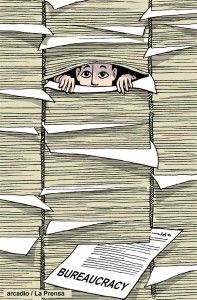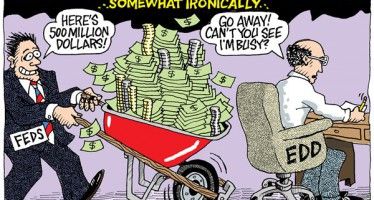CA tax board slow to act on protests

 If the California taxman unfairly penalizes you for an alleged infraction that you didn’t commit, don’t hold your breath waiting for justice. The Franchise Tax Board takes nearly four years on average to resolve many of its tax protests. That’s nearly twice as long as FTB’s guidelines allow. “[T]he time required to close docketed protests has increased 25 percent from an average of 35 to 44 months,” an FTB staff report states. Docketed protests are the more complex cases that are assigned to the FTB legal department; the rest are handled by auditors. Part of the reason for the backlog is that tax protests have increased 35 percent in the past three years, according to the report. Protests requiring docketing have increased 28 percent. Sixty three percent of the current caseload is older than the FTB’s two-year guideline for resolving protests. That’s up from 55 percent two years ago.
If the California taxman unfairly penalizes you for an alleged infraction that you didn’t commit, don’t hold your breath waiting for justice. The Franchise Tax Board takes nearly four years on average to resolve many of its tax protests. That’s nearly twice as long as FTB’s guidelines allow. “[T]he time required to close docketed protests has increased 25 percent from an average of 35 to 44 months,” an FTB staff report states. Docketed protests are the more complex cases that are assigned to the FTB legal department; the rest are handled by auditors. Part of the reason for the backlog is that tax protests have increased 35 percent in the past three years, according to the report. Protests requiring docketing have increased 28 percent. Sixty three percent of the current caseload is older than the FTB’s two-year guideline for resolving protests. That’s up from 55 percent two years ago.
Shocked
“I was shocked, when I read the [report], that the board is moving further away from its goal of resolving protests on an average of 24 months, rather than moving forward,” David Doerr, chief tax consultant for the California Taxpayers Association, told the board at its Sept. 4 meeting. “I was very, very unhappy to see that. Certainty is an important issue, an important principle of tax policy. And when these protests linger, taxpayers must live under a cloud of uncertainty. And that disrupts business plans and can disrupt family decisions. It can disrupt even a person's health.
“So we think it's highly important that this be turned around and we start moving back towards the original goal, rather than moving away from the original goal. You have two [additional] positions budgeted for this. I'm not sure that’s even enough. You may need to hire more staff if you really want to get this turned around. This is a real sad thing to see.”
Also concerned is Deputy State Controller for Taxation Marcy Jo Mandel, who was representing State Controller John Chiang on the board.
“I think I used the same word when I was talking to staff, that I was shocked to see the number as well in terms of where things were with protests,” she said.
She asked Chief Counsel Jozel Brunett what's been going on and how she is intending to turn it around. Brunett blamed it on budget cuts that have laid off 20 staff members at the same time that protests have been increasing.
A storm
“All of those factors have created a storm, and we're moving away from the goal,” she said. “We don't want to move away from the goal. We want to move toward the goal, which is why we've requested the additional resources…. The top priority for our business plan is, in fact, to reduce the growing protest backlog. We hope to, obviously, move back toward the goal.”
Mandel asked that the board be kept up to date on the protest backlog.
“It's been quite a while since we had a report on protests, and we could go back and look at those reports for an idea of what we used to get, which was, I think, types of protests, where they were, what's holding them up, if there's something that's being held pending litigation,” she said. “We had a whole bunch of different things that we used to get, and we haven't seen a report like that for a while…. It is one of those things that can get away from you if we're not focused on it.”
Board member Jerome Horton said that fixing the problem might require more than simply adding more staff.
“There's also systemic issues that we want to look at, procedural issues, and policy issues to see if there is a need for a change systemically, procedurally, and so forth, in order to bring some resolutions to these issues early on,” he said. “I know the FTB has expanded its outreach to California taxpayers to begin the educational process. And I for one believe that education is our greatest enforcement tool. It's also our greatest conflict resolution tool and problem solving tool.
“So to the extent that we can begin to identify specific areas where we may have challenges, be that in the tax credit, for example, research and development. Are we seeing an increase in those particular areas, and can we reach out or can we make systemic changes that may actually enhance the flow of the resolution of the problem? So it's not always attributed to staffing.”
Decade-old problem
The FTB’s delay in resolving tax disputes has been going on for at least a decade. Only 47 percent of corporate tax cases and 52 percent of personal income tax cases were being completed in 33 months or less in 2004, according to a March 2007 article by Eric Coffill, a partner in the Morrison & Foerster law firm.
“[T]here definitely remain clogs in the pipeline, as borne out by the author’s experience in his practice, where a protest filed in January 2001 is still pending at FTB as of the time of this article; and where FTB only in January 2007 issued a decision in a protest where the hearing was held in February 2005,” Coffill wrote.
Tax protesters aren’t the only ones having to bide their time waiting to hear from the FTB. It generally takes FTB 25 to 30 days to answer correspondence — a delay that can reach as high as 90 days at various times during the year.
Customer service a priority
Ironically, the FTB’s Taxpayer Bill of Rights 2012 report declares, “Customer service is a high priority. FTB’s service commitment is to treat taxpayers professionally, be accessible, provide accurate and clear information, and respond promptly.” In fact, FTB’s Mission Statement identified customer service as one of FTB’s core values. FTB’s Mission Statement is to provide the services and information to help taxpayers file accurate and timely tax returns and pay the proper amount owed.
Most of those customers may not be prepared for the 44-month wait for a resolution to their tax problem. The FTB website page titled “How can I dispute a penalty?” advises, “Please allow 6 weeks for a decision to be made.”
Related Articles
LAUSD system does not compute
You’d think a state that’s still by far the center of the global computer industry could produce government computer systems
DA: Bell Officials 'Looted At Will'
SEPT. 22, 2010 By TORI RICHARDS, reporting from the courtroom LOS ANGELES – The mayor and seven other current and




